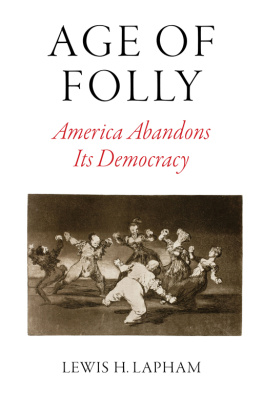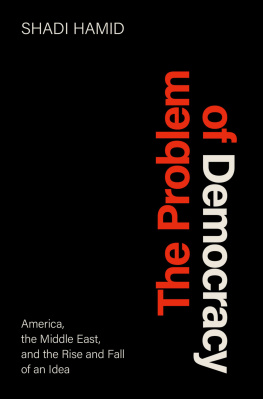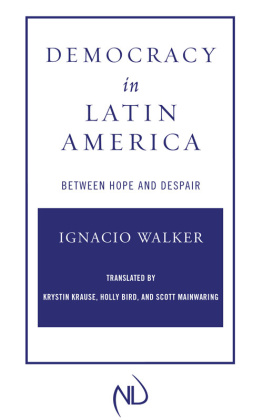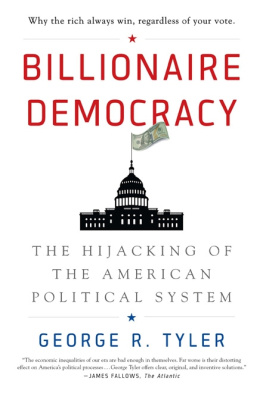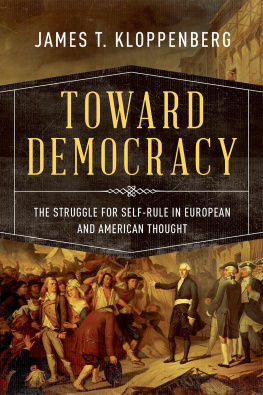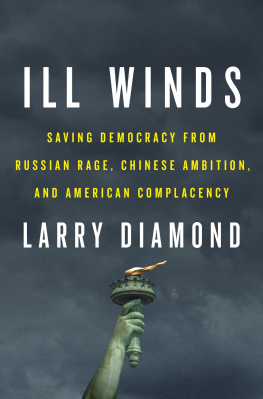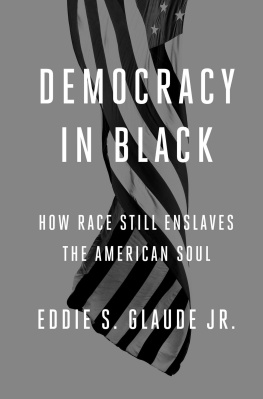Lewis H. Lapham
A frivolous society can acquire dramatic significance only through what its frivolity destroys.
Edith Wharton
The voices of conscience in every sector of the opinion-making news media stand united this fall in their fear and loathing of Donald J. Trump, real estate mogul, reality TV star, Republican nominee for president of the United States. The viewing with alarm is non-partisan and heartfelt, but the dumbfounded question How can such things be? is well behind the times. Trump is undoubtedly a menace, but he isnt a surprise. His smug and gloating face is the face of the way things are and have been in Washington and Wall Street for the last quarter of a century.
The age of folly of which Trump is an exemplary embodiment spreads across the pages of this book from Americas 1991 invasion of Iraq (reality TV show armed with self-glorifying high explosives and a nonsensical casus belli) to Trump in 2016 marching in triumph on the White House (self-glorifying photo op bursting star-spangled bombast in air). Over the course of the twenty-five years from point A to point B, America changes regimes; a weakened but still operational democracy gives way to stupefied, dysfunctional plutocracy.
The spectacle of a frivolous society seeking dramatic significance doesnt lend itself to the telling of an uplifting tale. For the ancient Greeks it served as a proof of Aristotles hypothesis that forms of government follow one another in a sequence as certain as the changing of the seasonsmonarchy dissolving into despotism, despotism overthrown by democracy, democracy degenerating into plutocracy, plutocracy prompting a return to monarchy. All government, according to Aristotle, is the means by which a privileged few arrange the distribution of property and law to the less fortunate manyan oligarchy, its life span dependent on the character of the men charged with the management of its moral, political and economic enterprise.
Oligarchies bear an unhappy resemblance to cheese. Sooner or later they turn rancid in the sun. Wealth accumulates, men decay, and a band of brothers that once might have aspired to forming a wise and just government acquires the texture of what Aristotle likened to that of the prosperous foola class of men so besotted by their faith in money that they therefore imagine there is nothing it cannot buy. Afflicted with the illness diagnosed by the Greeks as pleonexia, the unbridled appetite for moremore laurel wreaths and naval victories, more banquets, dancing girls, and mirrorsthe fatted calves forget why sovereign nations go to war or how it comes to pass that money doesnt grow on trees.
By 1990, America was showing vivid signs of the disease. President Ronald Reagans dancing onto the White House stage in 1981 foretold the second coming of an American Gilded Age more selfish than the first; greed was good, money the hero with a thousand faces, the notion of such a thing as democratic self-government slipping from the mind of an electorate asking of its rulers what the rich ask of their servantscomfort us, be good to us, tell us what to do.
Democracy degrading into plutocracy was the work in progress when the unlooked-for collapse of the Berlin Wall in November 1989 confronted the prosperous bourgeois statesmen in Washington with a problem undreamed of in their philosophy: What to do without the Russians. For half a century, as long as anybody inside Washingtons Beltway bubble could remember, the Evil Soviet Empirestupendous enemy, world class and operatic, menace for all seasonshad furnished nine American presidents with a just and noble raison detat, fattened Americas gross domestic product on the seed of profligate defense spending, smothered the mutterings of American political dissent with the fear of nuclear annihilation.
A precious asset, the Communist ogre in the totalitarian snow, and in 1990 sorely missed. Absent the Cold War with the Russians, how then defend, honor, and protect the cash flow of the nations militaryindustrial complex pumping air and iron into the conspicuous consumptions of the American dream? The government had on hand a war machine marvelous to behold and expensive to maintaingun platforms of every conceivable caliber and throw-weight, aircraft, tanks, and naval vessels at all points of every compass, guidance systems endowed with the wisdom of angels and armed with the judgments of doom. But other than as a means of changing lead into gold, who could say what the thing was supposed to do? Where was the tactical or strategic objective, and to what end the patriotic call to arms?
In search of dramatic significance, President George H. W. Bush in 1991 sent the gunboats, the cameras, and the flags to the Persian Gulf; his historically illiterate adjutants at the Pentagon (among them Secretary of Defense Dick Cheney and Chairman of the Joint Chiefs of Staff Colin Powell), drafted a Defense Strategy for the 1990s appointing America Keeper of World Peace. As subsequently published in 1993, the policy paper envisioned an invincible military establishment capable of waging, simultaneously, major wars on two continents, while at the same time attending to the minor nuisances of terrorists here and there in the slums of the Middle East and bandits in the mountains of Afghanistan and the jungles of Colombia. The claim to the crown of world empire set forth the doctrines of Forward Deterrence, Anticipatory Self-Defense, and Preemptive Strike, informed the lesser nations of the earth of their inferior and subsidiary status. Let any failed or upstart state even begin to think of challenging American supremacy, and America reserved the right to strangle the impudence at birth, bomb the peasants or the palace, block the flow of sympathy and bank credit, change the sheets in the brothels and the information ministries.

